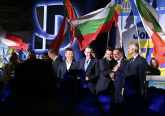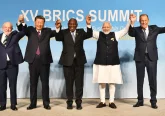Elections and the elusive quest for peace and stability in the eastern DRC: A perspective from the ground, based on fieldwork carried-out in North Kivu province in August and September, 2011
By Lindsay Scorgie
Driving down the dusty main road of Butembo – a city of over half a million people, in the eastern DRC province of North Kivu – I hear the usual urban Congolese noises of motorcycles and lorries driving madly by. But these days there is a new sound too: shovels hitting the ground. All along the main road, construction is underway, as the central thoroughfare of Butembo is being paved for the first time. Not only is this an extremely rare sight in Congo, but it is an occurrence that many locals believe is being undertaken to strategically coincide with election season, the logic being that voters will go to the polls with evidence of development and progress fresh in their minds.
But this is Congo, and things here are much more complicated, even convoluted, than might appear at first glance. This construction project is in fact not being delivered by the government, but rather by the Chinese; it is behind schedule; locals who live close to the expanding road have seen their homes destroyed with no chance of compensation; and perhaps worst of all, in the eyes of many area residents, the paving is being confined to the city limits. Considering Butembo’s position as the trading hub of the region – or ‘the Dubai of Central Africa’ – this is not very helpful. Locals, especially businessmen, would have preferred to see resources spent on improving the vital routes to Kasindi, Beni, or Goma (parts of which hardly pass for roads at all, obviously hindering trade). Yet such a development, Kinshasa knows, could bring unprecedented power and influence to this independent-minded part of the country, orienting the province’s business and trade even further outwards towards neighbouring countries like Uganda, rather than inwards to the capital. The internal political and power dynamics of the DRC are indeed complex, working to a logic difficult for the international community to grasp (especially if attempted from a distance), let alone Congolese citizens.
It is not only with regards to the development sphere, however, that North Kivu residents have expressed dismay, concern, and confusion. Their more immediate worries and questions surround the state of security. This is a part of the country where a large proportion of residents fundamentally disagree with the western imposed label of ‘post-conflict’. “Some pockets [of North Kivu] have felt stability, but most have not”, explained a local NGO employee to me. “How can there be peace with this many IDPs [internally displaced persons], and when Lubero [a territory of North Kivu] is at full-out war?”, he asked.
The combination of a history and culture of violence in the DRC, together with an election process featuring an alarming lack of candidates running on platforms of any real political substance, seems to have resulted in an election atmosphere characterized by tactics of coercion, intimidation, and fear. In light of this lack of stability in the area, my interviewees consistently expressed the opinion that the upcoming elections would not only fail to bring peace, but could potentially seriously exacerbate and heighten current levels of violence. While conducting fieldwork in the region throughout August and September, the first signs of this were visible. Local conflict resolution and peacebuilding groups reported increased activity on the part of nearby rebel groups (most notably various Mai Mai factions and the Allied Democratic Forces), as well as the formation of numerous militias.
The area’s ever present rumor-mill was also in full gear with reports of a new rebel group having been created in the north of the province. A road I traveled between the cities of Beni and Butembo at the beginning of my fieldwork became increasingly dangerous over the course of my stay. Regular attacks on civilians last month throughout this Beni-Butembo route have been said to be the activity of bandits placed there by Mbusa Nyamwisi, a local politician (also former warlord) running for the post of president. Many of these developments and occurrences are often difficult to factually verify, in an area of Congo that suffers severely from poor information flow, commonly exacerbated by an unwillingness on the part of external actors to share information with local groups. Nevertheless, there was no denying the rapidly changing security environment.
This security predicament has by no means been limited to the Grand Nord area of North Kivu. Just in the past week, violence has marred Goma, when fighting broke out after the kidnapping of a musician who refused to sing for President Kabila. Furthermore, over a hundred North Kivutiens have recently fled the province into Uganda’s Hoima district, escaping a combination of increased militia activity, and fear of violence erupting in the election aftermath.
For many in the west, the logical response to this deteriorating election environment has been to advocate for increased international assistance and presence in the elections. What may come as a surprise to many, however, is that this is not a sentiment automatically shared by all of those on the ground, living the situation. “Yes, donors are giving enough money, there’s enough international community presence here”, one staff member of a North Kivutien rights group explained to me. “The temptation of the west is to take the responsibility of the government”, he went on to say, “but this isn’t sustainable”. This points to the overall question of whether building-up the Congolese state represents the way out of the country’s humanitarian and security predicament. It is a strategy that the international community has thus far bought into – but one that arguably has delivered few tangible results.
Elections are often considered by international donors to be one of the more straight-forward elements of an overall peace or development process to support. In the case of the DRC, for example, getting involved in elections is nowhere near as messy as attempting to thoroughly understand the grievances or power politics behind the multitude of still-roving rebels in large tracts of the country. But perhaps this approach needs to start to be questioned a little more – or at the least, perhaps the more fundamental issues behind why Congo’s road to democracy is such a volatile one needs to be given due attention before elections are automatically advocated for. As Michela Wrong pointed out in an article written at the time of the first DRC elections in 2006 – and which still proves potentially timely for today’s situation – “If all hell breaks loose in the DRC [after the elections] … it will be tragic evidence of the damage a very human inclination to hope for the best can do” (Wrong, 2006).
Sources
AlJazeera.net, 8 November 2011: Tensions rise in DRC Congo in run-up to polls
Hogg, Jonny. Reuters, 8 November 2011: AU boss jets to Congo amid rising tension, violence
Kibego, John. The Observer, 6 November 2011: Uganda: Congolese Flee DRC Ahead of Elections
RFI, 8 November 2011: RDC: colère à Goma après la disparition d’un musicien populaire
Rowling, Megan. AlertNet, 3 November 2011: Elections won’t solve Congo’s humanitarian woes – report
Wrong, Michela. New Statesman, 9 October 2006: Why hoping for the best brings the worst
York, Geoffrey. The Globe and Mail, 25 October 2011: ‘All-out war’ feared as Congo goes to the polls
The presidential elections in the Democratic Republic of the Congo on 28 November promise violence, demonstrate international failure and offer no perspective of change
By Hubertus Juergenliemk
The second parliamentary and presidential elections in the Democratic Republic of the Congo (DRC) since independence in 1960 in a few days time on 28 November 2011 are a crucial indicator for the state of the country. “Second elections are vital to consolidate democratic peace gains in the country, complete a full electoral cycle and strengthen democratic institutions”, says Thierry Vircoulon, the International Crisis Group’s Africa Director, calling them the ‘ultimate test’ for the DR Congo (cf ICG 2011). The recent violence mainly results from local tensions between the 19,000 candidates for the 500 seats in parliament and the election campaigns of the two main presidential candidates, Etienne Tshisekedi and Joseph Kabila. The United Nations, the European Union and all 193 UN members are called for in these final days before the elections to show visibility, affirm their commitment to the DR Congo and to sending additional resources and observers to avoid what is still avoidable.
The signs for these elections are dooming with political violence, corruption and fraud visible in several instances. If the election conduct and the outcome will be highly disputed chances are that large-scale violence might re-emerge and years of investment towards more stability and a democratic political system are lost. The international community finances the UN operation in the Congo with 1.4 billion US$ (UN 2011) and additional bilateral and multilateral aid programmes, but it is doing shamefully little to assure these elections put the country on a firm track towards consolidation. Financial or political considerations preventing engagement should not count, as the benefits from reasonably fair elections will far outweigh any costs.
Elections are never a one-off event. They are held in a particular context, show political cleavages and have consequences. Elections caught with fraud, corruption and violence can destabilise a country, allowing citizens to loose fate in the process of democratic practice. Elections offer a clear chain of delegation between voters and politicians in providing them with (input) legitimacy. They also hold the past government accountable. Although there is no direct relation between election observation and successful elections an independent observer mission has a number of benefits. It offers a non-partisan source of information on the conduct of elections and can give legitimacy to claims of criticism or success of the elections. In addition, it shows that the government accepts to be judged by the people and in instances might deter fraud. In other instances the reporting of misconduct or violence allows the justice system to prosecute criminal activity. In regard to the international community, election monitoring is a signalling game. It shows that the international community has a stake and interest in the elections and is committed to the country and its citizens. In a second step, it shows that the government is accountable to international standards and not only to domestic norms.
How is the international community engaged in the DR Congo? While the United Nations Security Council acknowledged in its resolution 1991 of 28 June 2011 that the elections in the DR Congo are a “key condition for the consolidation of democracy, national reconciliation and restoration of a stable, peaceful and secure environment in which stabilization and socio-economic development can progress” it places the main responsibility for the elections with the Congolese government instead of ensuring the government has the necessary means available to conduct them. In a country the size of Europe with some of the weakest governance structures in the world and divided by a history of violence and conflict, it is not enough to help with the logistics of ordering ballot boxes. Hundreds of advisors, specialists and supporting staff would be needed to ensure a smooth running of the elections. The UN Organization Stabilization Mission in the DR Congo (MONUSCO) works with a small term instead. Financially, the Congo is also expected to carry the main costs. Of the estimated 1.2 billion US$ for the elections (Reuters 2011), about 800 million are paid by the Congolese government out of a 7.3 billion US$ annual budget, half of which is funded externally. In contrast to little international action, preparations for violence are in full swing in the Congo. Little coverage is currently given to the DR Congo and its problems on the international agenda. Nonetheless, the consequences of these elections will stick in the collective memory for years to come, framing the Congo’s future.
The European Union portrays itself as a champion of democracy and electoral support. But how far does it go? The statement by EU High Representative Catherine Ashton on 19 October 2011 read:
“The second general elections… represent an opportunity for all the stakeholders to promote their vision regarding the future of the DRC in a peaceful and constructive way and to the Congolese people to exert their fundamental rights to make a choice regarding the conduct of public affairs for the coming years… I believe that the country deserves our support in this effort… I wish her [Mariya Nedelcheva]and her team all success in their independent assessment of these important elections”.
The EU cut their observers from 300 in 2006 to 147 observers for the over 60.000 polling stations. Also, despite being a rich organization, the EU merely provides 47,5 million EUR to estimated election costs of one billion US dollar. The election observation mission is led by a 32-year old, inexperienced member of the European Parliament (MEP). Based on the criteria by the German Centre for Peace Operations that administers the German pool of deployable experts, it is likely that she would not have qualified as observer. Mariya Nedelcheva heads a team with five core staff, 46 long-term observers and 92 short-term observers that will assess pre-election preparations and campaign in all provinces of the DRC, as well as voting, counting, tabulation processes and complaint procedures (European Commission 2011; Congoplanet 2011). Her experience includes work as a Parliamentary Secretary for the Citizens for European Development of Bulgaria until July 2009 after which she joined the European Parliament. Holding a Master in Political Science from Bordeaux (2002) and having earned a PhD in 2011 in parallel to being an MEP on party political systems in Bulgaria, Romania and the Czech Republic in 2011, it is questionable if no more experienced candidates could have been found.
Given this setup, MONUSCO has to shoulder the main burden of the logistics and support to the government, but it works with very little resources in a large country with very little infrastructure. MONUSCO’s electoral division consists of 51 professional (international) staff, 86 UN volunteers and 41 local staff, working around the clock to distribute the 4,000 tons of election material: 186,000 ballot boxes and 64 million voting cards to 62,000 polling stations (BBC 2011). On the ballots are the eleven candidates for the presidential election and 19.010 candidates from 428 registered parties for the 500-seat parliament to be elected by the 32 million registered voters (ICG 2011).
The elections could consolidate the voting process as part of a gesture of unity for the 32 million registered voters, and despite its contestation, offering a landmark for the DRC, in building a track record after the 2006 elections. But the fear of fraudulent or poorly conducted elections to spark violence and set back development is felt by the population. “We have significantly less electoral observers than in 2006”, said Paul Nsapu, General Secretary of the International Federation for Human Rights (FIDH), but “after so many decades of war and plunder, the Congolese people deserve peace and stability” (cf ICG 2011).
The table shows the increase of everything but international support for the 2011 election, in comparison to 2006 (compiled by the ICG). 25 million voters were registered then, 32 million now. 19,010 candidates are competing now, more than double the 9,709 candidates then and showing the potential for friction at the local level. For this the number of compilation centres for ballot boxes was reduced from 2,528 to 168; not one UN Observer is monitoring, while 2,520 UN Observers were on the ground in 2006 and the EU halved its observers from 300 to 147. The warnings by NGOs, such as Human Rights Watch in a coalition of 47 organizations in June that the UN was not sufficiently prepared for the elections and lacks “adequate and appropriate resources to protect civilians… and to avert election-related violence” (HRW 2011) were not acted upon. In contrast to sending a small monitoring mission a stronger signal, similar to 2006 would have been necessary. Instead of 46 long-term observers several hundred should have been deployed and placed within communities, organising and facilitating workshops. For example for politicians on good practices on campaigning and political messaging, workshops for voters on the powers and legitimate expectations of parliamentarians and large organised events for facilitating a competition of parties, ideas, goals and visions for the Congo. Managing realistic expectations is as important as the outcome itself.
Given the way the elections preparations have unfolded these elections have the potential to create instability and spread insecurity if local politicians use violence, corruption and money to buy votes in a situation in which the people aim for change. Using music and trucks with sound systems to reach voters as it is done at the moment is necessary but not sufficient way for successful campaigns and for informing voters. Jerome Bonso, Chairman of the National League for Free and Fair Elections, told IRIN in Kinshasa underlines that these elections are taking place in a different context from 2006: “We have to consider events such as the Arab spring where the population spearheaded change in their countries’ leadership. The reality on the ground is that Congolese today need change,” Bonso said. “If they fail to get this change through the elections, they might go the way the population in the Arab countries went” (cf IRIN News 2011).
Comparing the upcoming elections to the 2005-2006 elections (from ICG)
| 2005-2006 | 2011-2013 | |
| Registered votersPresidential candidatesCandidates for 500 seats in National Assembly
Registered political parties Available polling stations Available Compilation centers for ballot boxes Judges appointed to manage electoral disputes EU observers UN observers |
25,712,552339,709 candidates
288, which all signed the code of conduct 50,045 polling stations
2,528
Large number appointed 300 2 2,250 3 |
32,024,640 11 19,010 candidates
428, of which only few signed the code of conduct 62,000 polling stations 168
8 at the Supreme Court 148 4 No UN observers |
| 1Agir pour des Elections Transparentes et Apaisées (AETA), Oct. 14 2011, Déclaration de la Société Civile Congolaise sur l’Evaluation Technique de l’Exécution du Calendrier Electoral par la CENI et son Impact sur l’Echéance Electorale du 28 novembre 20112 EU EOM, 2006, Presidential, legislative and provinciale elections EU Election Observation Mission
3 UNOPS, 2006, Democratic Republic of the Congo Operations Centre 4 EU EOM, 2011, Mission d’observation électorale de l’Union européenne |
||
Sources
BBC, 28 October 2011: DR Congo election: Rights groups warn of instability.
Congoplanet 19 October 2011: European Union to observe presidential and legislative elections
ElectionGuide 11 November 2010: Country Profile DR Congo
European Commission 2011: European Commission Election Observation Mission website
European Parliament 11 October 2011: MEP Profile Mariya Nedelcheva
Human Rights Watch 9 June 2011: DR Congo: Strengthen Civilian Protection Before Elections
IRIN News 4 November 2011: DRC: Congolese voice their hopes for the elections.
Nedelcheva, Maria 2011 Personal website, accessed 4 November 2011.
Reuters 2011: Congo election may be delayed on logistics setback, costs, 31 August 2011.
United Nations 2011: MONUSCO Facts and Figures
United Nations Security Council 2011: S/RES/1991 (2011) Resolution 1991, 28 June 2011
Hubertus Juergenliemk and Lindsay Scorgie are both doctoral candidates in Politics and International Studies at the University of Cambridge.
Photography courtesy of MONUSCO.









1 Comment
In my opinion, i think that this writing is so wonderful